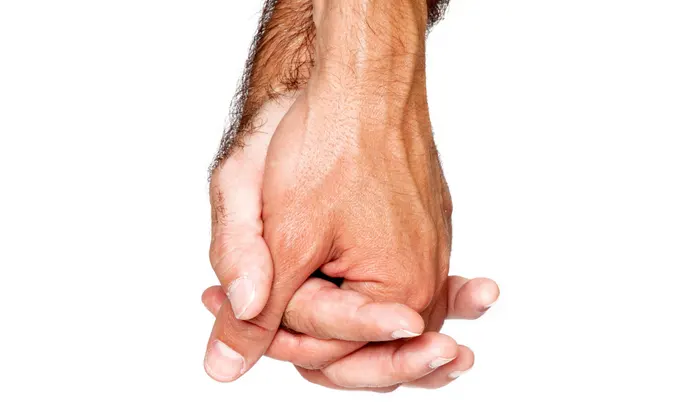Closed Triad Relationship: Exploring the Complexity and Connection
Polyamory is the practice of engaging in multiple romantic relationships with the consent of all parties involved. In a closed triad relationship, three individuals are involved in a committed and exclusive partnership with each other. This means that the three people in the triad are only romantically and sexually involved with each other, and not seeking other romantic connections outside of the triad.
Compared to traditional monogamous relationships, closed triads involve a unique dynamic in which all three individuals are equally committed to each other. Unlike open polyamorous relationships where individuals may have multiple partners outside of the primary relationship, closed triads strictly limit romantic and sexual connections to just the three individuals involved.
Exploring the dynamics, challenges, and rewards of closed triad relationships can provide valuable insights into the complexities of managing multiple partners and the benefits of mutual support and love. Understanding the unique communication, intimacy, and decision-making processes within closed triads can shed light on the potential for deep emotional connections and personal growth within this type of polyamorous arrangement.
Defining the Closed Triad
A closed triad relationship consists of three individuals who are romantically and often sexually involved with each other and agree not to have outside partners. This means that all members of the triad are committed to each other exclusively and prioritize the relationship within the triad above all others.
One of the key aspects of a closed triad is the commitment and emotional investment that each member has with the other two. This level of commitment requires open communication, trust, and a strong bond between all three partners.
Closed triads can come in various gender combinations, including three people of the same gender, two people of one gender and one of another, or a mix of gender identities. Additionally, within closed triads, the relationship structure can vary widely, with some triads being hierarchical (one person is involved with the other two, who are not involved with each other), and others being egalitarian (all three members are involved with each other equally).
Overall, a closed triad relationship involves a deep commitment to the emotional and physical well-being of all three individuals, and a mutual agreement to maintain exclusivity within the triad.
The Dynamics of Closed Triad Relationships
Closed triad relationships involve three individuals who are mutually committed to each other emotionally, physically, and logistically. The dynamics in such relationships require equal involvement and attention to ensure that no partner feels excluded or less important. Emotionally, it’s essential for each partner to feel valued, heard, and supported. Physically, the dynamics may vary depending on the individuals involved, but it’s crucial for all partners to feel satisfied and connected. Logistically, the partners must navigate day-to-day life together, including decision-making, planning, and household responsibilities.
Addressing common misconceptions, it’s important to note that closed triad relationships are not solely about sexual aspects; they involve deep emotional connection and commitment among the three partners. These relationships can be just as, if not more, committed than monogamous relationships. Each partner brings something unique and valuable to the relationship, and these partnerships can be stable and fulfilling for those involved.
In conclusion, closed triad relationships require open communication, equal involvement, and respect for each partner’s needs and desires. When these dynamics are properly navigated, these relationships can be fulfilling and successful for all individuals involved.
Communication and Boundaries
Communication is a vital component in maintaining a healthy closed triad relationship. Open and honest communication is essential for all partners to feel heard, valued, and understood. It allows for the expression of needs, desires, and concerns, fostering a sense of mutual respect and trust among all members.
Setting and respecting boundaries is equally important in a closed triad relationship. Each partner should articulate their individual boundaries and be willing to negotiate and compromise as the relationship evolves. Consistently checking in with each other and reassessing boundaries is crucial, as individual needs and dynamics can change over time.
Challenges in effective communication may arise, such as navigating power dynamics, managing jealousy, or addressing conflicts. However, strategies such as active listening, empathy, and clear and non-judgmental communication can help overcome these obstacles. Seeking the support of a relationship counselor or therapist can also provide additional guidance and tools for effective communication.
Ultimately, a healthy closed triad relationship relies on the continuous and intentional effort of all partners to communicate openly, set and respect boundaries, and navigate challenges together.
Managing Jealousy and Insecurities
Managing jealousy and insecurities within a closed triad relationship can be complex. The unique dynamic of three individuals can often lead to intensified feelings of jealousy and insecurities. In a closed triad, each member may experience feelings of being left out or not receiving equal attention from the other partners, which can lead to jealousy and insecurities.
To foster trust and security within the triad, open and honest communication is vital. Each member must feel comfortable expressing their emotions and concerns without fear of judgment. Setting boundaries and expectations can also help manage jealousy and insecurities, as it creates a sense of security and clarity within the relationship. Additionally, showing appreciation and reassurance to all members of the triad can help alleviate insecurities and build trust.
It is essential for all members of the triad to work on their individual insecurities and self-esteem. Building self-confidence and addressing personal insecurities can improve the overall well-being of the triad. Seeking professional help, such as therapy or counseling, can also provide a safe space for triad members to work through their emotions and develop healthy coping mechanisms.
In summary, managing jealousy and insecurities in a closed triad relationship requires open communication, setting boundaries, showing appreciation, and addressing personal insecurities. It is essential to foster trust and security within the triad by working together to create a supportive and understanding environment.
The Role of Counseling in Closed Triads
Seeking counseling for closed triad relationships can bring about numerous benefits, especially when navigating complex emotions and communication issues. A therapist can provide a safe and neutral space for all parties involved to express their thoughts and feelings, as well as help them develop healthy ways to manage these emotions. This can be particularly important in closed triad relationships where the dynamics can be more complex and the need for effective communication is heightened.
Finding a therapist who is knowledgeable and understanding of polyamory is crucial in order to address the unique challenges and dynamics of closed triad relationships. A polyamory-aware therapist can provide valuable insight and guidance, offering a deeper understanding of the nuances of such relationships.
In therapy, topics such as effective communication, boundaries, and managing jealousy are typically explored. These are essential areas to address in closed triad relationships, as they can significantly impact the dynamics and overall well-being of all involved. Therapy can also help the individuals in the closed triad develop a better understanding of themselves and each other, ultimately leading to healthier and more fulfilling relationships. Overall, seeking counseling for closed triad relationships can provide much-needed support, guidance, and tools for navigating the unique challenges that may arise.
The Social and Legal Landscape
The social perception of closed triad relationships often carries stigma and misunderstanding, with many individuals facing challenges when coming out as polyamorous. Society’s ingrained monogamous norms can lead to judgment and prejudice, making it difficult for triad members to openly express their relationships. This can result in feelings of isolation and a lack of validation for their feelings and choices.
Additionally, the lack of legal recognition for polyamorous relationships has significant implications for triad members in various aspects of their lives. In healthcare, for example, triad members may encounter difficulties in decision-making and visitation rights. Parenting arrangements and custody rights may also be complicated due to the absence of legal protection for polyamorous relationships. Financial planning, such as inheritance and taxation, can be challenging without legal recognition and protection.
The social and legal landscape for closed triad relationships highlights the need for greater understanding and acceptance from society, as well as the necessity for legal recognition to ensure the rights and well-being of triad members in healthcare, parenting, and financial matters.
Longevity and Evolution of Closed Triads
Closed triad relationships have the potential for long-term commitment and growth, as the dynamics of a closed triad can create a strong foundation for lasting relationships. Over time, closed triads may evolve as the individuals involved grow and change. This can lead to shifts in relationship dynamics and the possibility of transitioning to other forms of polyamory or even monogamy. Successful closed triads often communicate openly and honestly, allowing for the growth and evolution of the relationship over time.
There are numerous success stories of long-lasting closed triads that demonstrate the potential for longevity within these relationships. Couples who have successfully maintained a closed triad for many years often credit their commitment to open communication, honesty, trust, and a shared vision for the future. These relationships often evolve as the individuals involved grow and change, and are open to the possibility of transitioning to different relationship structures if and when it feels right for all parties involved.
In conclusion, closed triads have the potential for long-term commitment and growth, and can evolve over time to meet the changing needs and desires of the individuals involved. There are many success stories of long-lasting closed triads that demonstrate the potential for longevity within these relationships.
Conclusion
Closed triad relationships are inherently complex due to the multiple connections and dynamics involved. Each individual in the triad has their own unique relationship with the other two, creating a web of interconnected emotions, needs, and boundaries. Navigating communication and decision-making can be challenging, as each person’s feelings and desires need to be taken into account.
It’s important to recognize the diversity and validity of different relationship structures, including closed triads. Just as monogamous and open relationships are valid, so are closed triads. Each relationship form has its own strengths and challenges, and what works for one group may not work for another.
Encouraging openness and understanding towards non-traditional relationship forms is essential in creating a more inclusive and accepting society. Love and connection come in many different forms, and it’s important to support individuals in finding the relationship structure that best aligns with their needs and values. By embracing the diversity of relationship structures, we can create a more inclusive and supportive community for all.
Triangle of Trust: Navigating the Bonds of Closed Triad Relationships
Step into the world of closed triad relationships, where complexity meets unparalleled connection and every interaction strengthens the bonds of trust and love. SwingTowns opens its doors to those curious about or currently navigating this intimate dynamic, offering a space for support, exploration, and understanding. Embark on your journey of deep connection by signing up for a free account on SwingTowns today. Let’s discover together the beauty and challenges of closed triad relationships, creating a future where every bond is celebrated and cherished.
“This site has been super fun. Would highly recommend for all players :)” -coltpl4y
Also Read: How to Deal with Conflict in Polyamorous Relationships







